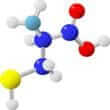Background
- Aspartic acid is an acidic amino acid that is used by humans as a building block for protein synthesis. An aspartate is any salt of aspartic acid. Aspartic acid is made in adequate quantities by the body (non-essential).
- Aspartates are taken by mouth to increase the absorption of mineral supplements, reduce fatigue, and enhance athletic performance. Mineral aspartates have also resulted in blood pressure-lowering effects and enhanced wound healing. Human studies using aspartic acid alone are needed in order to determine whether its effectiveness is due to the aspartate or the mineral or amino acid to which it is bonded.
- It is hypothesized that the effects of aspartic acid may be due to its ability to reduce ammonia levels in the body.
- Other clinical areas of interest include immune system stimulation, cholesterol-lowering effects, memory enhancement, and hepatic protection.
- L-aspartic acid is currently listed on the U.S. Food and Drug Administration (FDA) Generally Recognized as Safe (GRAS) list.
- Dr. Laborit was the first to suggest an ergogenic potential for magnesium and potassium aspartates in 1957. Human trials involving Spartase® (magnesium and potassium aspartate mixture) were initiated in the early 1960s in the areas of athletic performance and chronic fatigue.
- According to secondary sources, Spartase® was a listed as a drug for fatigue in the United States in 1961 and was eventually banned in 1970 due to changes in FDA requirements. Magnesium-potassium aspartate supplements appeared on the market in the United States in 1994.
References
- Abel, T., Knechtle, B., Perret, C., et al. Influence of chronic supplementation of arginine aspartate in endurance athletes on performance and substrate metabolism - a randomized, double-blind, placebo-controlled study. Int J Sports Med 2005;26(5):344-349.
View Abstract - Beltz, S. D. and Doering, P. L. Efficacy of nutritional supplements used by athletes. Clin.Pharm. 1993;12(12):900-908.
View Abstract - Colombani, P. C., Bitzi, R., Frey-Rindova, P., et al. Chronic arginine aspartate supplementation in runners reduces total plasma amino acid level at rest and during a marathon run. Eur J Nutr. 1999;38(6):263-270.
View Abstract - De Aloysio, D., Mantuano, R., Mauloni, M., et al. The clinical use of arginine aspartate in male infertility. Acta Eur Fertil. 1982;13(3):133-167.
View Abstract - Denis, C., Dormois, D., Linossier, M. T., et al. Effect of arginine aspartate on the exercise-induced hyperammoniemia in humans: a two periods cross-over trial. Arch.Int Physiol Biochim.Biophys. 1991;99(1):123-127.
View Abstract - Firoz, M. and Graber, M. Bioavailability of US commercial magnesium preparations. Magnes.Res. 2001;14(4):257-262.
View Abstract - Franzoni, F., Mataloni, E., Femia, R., et al. Effect of oral potassium supplementation on QT dispersion in anorexia nervosa. Acta Paediatr. 2002;91(6):653-656.
View Abstract - Hurson, M., Regan, M. C., Kirk, S. J., et al. Metabolic effects of arginine in a healthy elderly population. JPEN J Parenter.Enteral Nutr. 1995;19(3):227-230.
View Abstract - Kirk, S. J., Hurson, M., Regan, M. C., et al. Arginine stimulates wound healing and immune function in elderly human beings. Surgery 1993;114(2):155-159.
View Abstract - Rees C. J., Oppong, K., Al Mardini, H., et al. Effect of L-ornithine-L-aspartate on patients with and without TIPS undergoing glutamine challenge: a double blind, placebo controlled trial. Gut 2000;47(4):571-574.
View Abstract - Rüddel H, Werner, C., and Ising, H. Impact of magnesium supplementation on performance data in young swimmers. Magnes.Res. 1990;3(2):103-107.
View Abstract - Spatling, L. and Spatling, G. Magnesium supplementation in pregnancy. A double-blind study. Br.J Obstet.Gynaecol. 1988;95(2):120-125.
View Abstract - Tuttle, J. L., Potteiger, J. A., Evans, B. W., et al. Effect of acute potassium-magnesium aspartate supplementation on ammonia concentrations during and after resistance training. Int J Sport Nutr. 1995;5(2):102-109.
View Abstract - Wagenmakers, A. J. Muscle amino acid metabolism at rest and during exercise: role in human physiology and metabolism. Exerc.Sport Sci.Rev. 1998;26:287-314.
View Abstract - Witteman, J. C., Grobbee, D. E., Derkx, F. H., et al. Reduction of blood pressure with oral magnesium supplementation in women with mild to moderate hypertension. Am.J Clin.Nutr. 1994;60(1):129-135.
View Abstract







